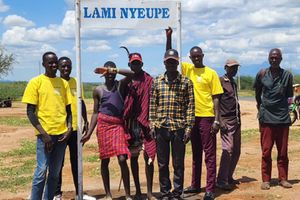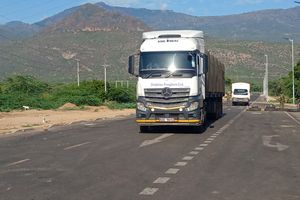
Kainuk Senior Chief Sarah Lochodo at Kainuk town on March 15, 2025. Last December, she was awarded with the Head of State Commendation for promoting peaceful coexistence along the Turkana-West Pokot border.
Kainuk town is buzzing with life as residents along the border of Turkana and West Pokot counties turn a new leaf, embracing gold mining and other commercial activities after the guns fell silent in the region.
It is clear that security in Kainuk and its environs has stabilised in recent times.
When the Nation visited this week, more than 100 trucks, bulldozers and excavators were parked on the side of the road in what was once a ghost town -- a good sign that security is improving and the town is rising from the ashes.
The safest place to park a vehicle used to be at the police station.
On Tuesday, we found drivers and turn boys who had spent the day at a gold mine in Lami Nyeusi, across the Malimalite River, taking a nap, others having a cold drink or dinner together, planning their next day.
They have occupied most of the hotels by booking accommodation for days and even months at a time, we learnt.
The relative peace has led to gold mining as an alternative livelihood for locals from the Turkana and Pokot communities, who have relied on pastoralism as their main source of income for generations.
Since October last year, Kainuk town, at the border of Turkana and West Pokot counties, has not recorded a single bandit attack, a welcome relief for residents.
Locals who had moved to safer towns, such as Lokichar and Lodwar, due to insecurity have returned to a more peaceful town where illegal firearms in civilian hands are now hard to find.
The locals have embraced the gold mining activities, which has boosted the confidence of motorists travelling the Kapenguria-Lokichar roads, most of whom now stop, a rarity when the area was insecure.
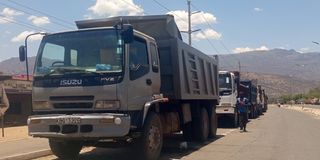
Some of trucks used in gold mining activities parked at Lami Nyeusi on March 15, 2025.
For decades, large herds of livestock attracted bandits who would ambush herders in the pastures and at the Malimalite River as they drove their animals to water.
One resident, Ms Margaret Arot, says young people who would have been idle in Kainuk town planning criminal activities are now working at the mining site.
"Drivers of the trucks and investors are from different parts of the country teaching our youth the importance of interacting with people from different communities. After a tedious day, they come to Kainuk where they have booked most hotels for accommodation and meals. Our town has turned over a new leaf," Ms Arot said.
A drive towards Lami Nyeusi, an infamous bandits’ hotspot, gives the impression of an area where the locals have fully embraced peaceful coexistence.
The area was characterised by dense thickets that bandits used as hideouts to ambush vehicles along the Kapenguria-Lokichar road. They would also take advantage of the low traffic on the road, sometimes raping women and girls.
Today, however, it is a beehive of activity.
Investors from most parts of the country use bulldozers and excavators to break up the hard ground to expose the ore.
The mined material, along with soil, is then loaded onto waiting trucks for processing near the Malimalite River. Youths from both communities are employed at various stages of the gold mining process, a welcome relief from the banditry that most of them were previously involved in.
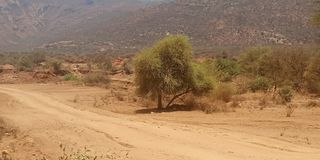
Lami Nyeusi in Kainuk town. The area had dense thickets where bandits used to hide to attack motorists. Security in the area has now improved.
In Lami Nyeusi, the first hotel, accommodation facility and petrol station are being built.
The locals, who had only built semi-permanent mud-walled houses and shops, are now transforming the area with permanent structures.
There is also a booming boda-boda business, with young people from villages inhabited by Pokot communities visiting Kainuk daily to buy and sell basic commodities such as farm produce, milk, goats, sugar and clothes.
Such activities have increased the amount of money circulating at the border, which previously relied on motorists for food, drink and, if lucky, shelter.
Due to tensions over attacks and security measures, including a curfew, no hotel would prepare meals for more than 100 people.
But today, accommodation facilities get many bookings, with the main customers being civil servants or employees of non-governmental organisations (NGOs), who account for more than 90 percent of bookings.
Green Garden Resort, which charges between Sh700 and Sh1,000 per bed, is fully booked by employees or investors working at the gold mining sites, Nation.Africa found during our spot check on Tuesday.
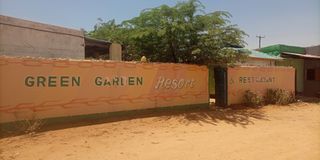
Green Garden Resort in Kainuk town.
The Swahili Dishes Hotel, Safari Plaza Hotel, Rhumba Place and Dinasty Hotel, which only operate when there is peace, are also now fully operational.
Kainuk is now a common border town, with elders like Mr Kirmat Longor from West Pokot now relying on hotels in town to sell fresh milk.
The revival of business activities was boosted last week when Kenya Revenue Authority Commissioner General Humphrey Wattanga inaugurated three Trade Facilitation Centres in Turkana, one of which is in Kainuk.
The centres are expected to boost trade along the Northern Corridor, a vital route linking Kenya to South Sudan, Ethiopia and Uganda.
"By enhancing trade facilitation and compliance, the initiative opens up business opportunities in Turkana County while reinforcing Kenya’s position as a regional trade hub," Mr Wattanga said.
Public transport companies, such as Quick Shuttle, have also set up offices in the town to provide timely bookings and courier services.
However, environmentalists have called on the authorities to protect the local environment from pollution related to the use of mercury, which could contaminate the soil, water in the river and the general atmosphere.
The river supports pastoralism, agriculture and domestic activities for hundreds of people in Turkana and empties into Lake Turkana.
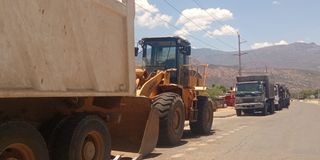
Some trucks and a tractor used in gold mining activities parked in Lami Nyeusi, Kainuk town on March 15, 2025.
Aroo Deputy County Commissioner Yusuf Salat confirmed that frequent peace meetings and drones supported by Operation Maliza Uhalifu, a multi-agency security framework run by the National Police Service and Kenya Defence Forces, had pacified the border.
"Since October last year, no bandits-related capital offences have been reported in Aroo Sub County. Locals have reopened their businesses attracting investors who are mining gold at nearby Lami Nyeusi, which was characterised by cattle theft and highway bandit attacks on motorists," Mr Salat said.
Kainuk Location Senior Chief Sarah Lochodo, who has played a major role in spearheading peaceful coexistence between Turkana and Pokot communities along the border and who received a Head of State recommendation from President William Ruto on December 12, 2024, says peace committees in villages along the volatile border have helped with mediation, recovering stolen livestock, reporting impending attacks as well as organising dialogue between warriors from both communities.
"To prevent conflicts over the pasture, we formed pasture committees that will monitor the movement of livestock along the border during the dry season and now when we expect heavy rains. It is through such structured committees that authorities capitalise on to promote livestock keeping as a business venture, not for traditions that ignite banditry," Ms Lochodo said.
Apart from mining being the latest business to come to the border, locals are also optimistic that sustained peace will open up the area as a tourist destination.
"We have South Turkana National Reserve that has wildlife such as elephants, gazelles, giraffes, and buffalo that had been labelled as disturbed and dangerous because that is where bandits targeting motorists would retreat to. Security interventions that include disarmament, an active dusk-to-dawn curfew, coordinated patrols along the highway, and unmanned aerial vehicles for surveillance have boosted security. We hope that tourists will now be attracted to the reserve and further boost local revenue," said Mr John Emeripus, a Kainuk resident.
The border has also attracted organisations such as Interpeace and the Free Pentecostal Fellowship in Kenya Church, which facilitate peace-building activities and train reformed warriors and victims of banditry in alternative livelihoods such as tailoring, hairdressing, farming and motorcycle repair.
Interpeace Project Coordinator Hassan Ismail cautioned border residents against generalising an entire community in cases of banditry, and advised a concerted effort to track down and single out criminals so that they can face the law individually.


